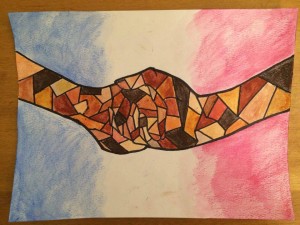The Rainbow Sign/ My Son, the Fanatic/ The Reluctant Fundamentalist
I attempted to make the piece abstract, which doesn’t help translate that it is a depiction of two hands holding onto each other. It was inspired from a quote from my notes that said something like, “We have much communication these days, but not contact.” (I think it was from the Aga Khan’s speech).
The hands are made up of fragments of different colored skin, because I wanted to show the unity of different people, ethnicities and identities. The background is a French flag because I made it around the time the Paris terrorist attacks happened, but it could be the flag of any country to be honest, because the message that I am trying to convey is a global one.
It is the same one the the Aga Khan talked about during his speech at Harvard.
A nation contains the narratives of countless identities and peoples. No one group—majority or not—has the authority to dictate what is the main narrative of a nation, or which individuals have more standing as citizens than others.
In the immediacy of terror and violence, it is difficult to stop scapegoating, or the blaming of a certain group in order to feel like one is attaining security. However, this will ultimately prove counteractive to the peaceful and cosmopolitan society that we are striving to create.
In the Rainbow Sign, the author describes the surprising sense of belonging that he felt for the first time upon returning to Pakistan from a lifetime in France. Even though he never felt quite like a national in Pakistan, he never felt—or was never allowed to feel—like he was French in France either.
In My Son, the Fanatic, the son of the narrator decides to turn to orthodox practices when he feels that his Westernization is giving in the the discrimination and injustices that he experiences for his ethnicity.
The Reluctant Fundamentalist likewise shows the dichotomy in identities that the narrator experiences during his college experience and beyond in America, and how no matter how much he succeeds, he never feels fully home there.
In all these stories, a common theme emerges: Europe seems pluralist in its makeup, but not in its spirit. This might have various social factors—such as the difference of the process citizenship is granted to immigrants—but nonetheless, it indicates that a more inclusive, new definition of a national identity is imperative to create true peace in Europe.
